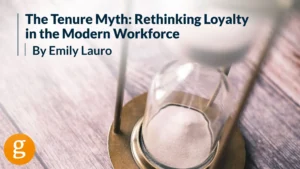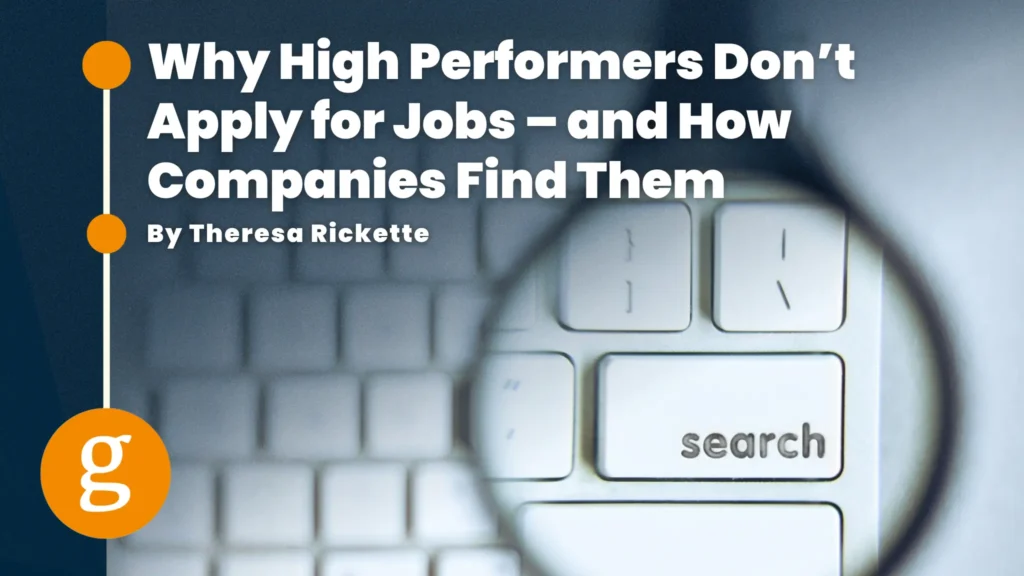The Tenure Myth: Rethinking Loyalty in the Modern Workforce
Emily Lauro | Financial Services, Hiring Advice, Leadership, Manufacturing & Engineering, Opinion, Opportunity for All, Senior Living | July 21, 2025

For decades, organizations have clung to the idea that long job tenure equates to loyalty, value, and reliability. Hiring companies still (and often) turn away strong candidates due to the perceived red flag of multiple jobs within a few years. The belief is that candidates who “stay” are the best investments, promising not only loyalty and reliability but also higher employee retention rates and reduced onboarding and training costs.
Fair enough – but only in a historical context that no longer exists. In today’s globalized business environment and evolving workforce, these traditional views of tenure are outdated and in many ways a myth. Numerous factors influence job tenure today, with generational shifts (including changes in values and career expectations), economic uncertainty, and instability around job security being just a few.
Let’s talk numbers…
According to the U.S. Bureau of Labor Statistics (BLS), in January 2024, the median number of years that wage and salary workers had been with their current employer was 3.9 years, down from 4.1 years in January 2022 – and the lowest since January 2002. Even shorter durations are common in fast-moving industries like hospitality, tech, and construction.
This trend is especially true among Millennials and Gen Xers, who currently represent the largest demographics in the U.S. workforce (36% and 31%, respectively). These generations and young people behind them in the workforce prioritize career growth, personal development, and value alignment over long-term security in a single company.
Even Baby Boomers, often romanticized as the “loyal generation” due to their historical footprints on long-term employment with a single company, are no longer staying in one job for decades, or lifelong employment, or retiring with a gold watch. As of January 2024, the median job tenure of workers ages 55 to 64 was 9.6 years.
Companies are missing out on top talent
As a talent recruiter, every week I see organizations pass on phenomenal candidates who have held multiple roles in a short time span. Conversely, rather than reject these candidates outright, other organizations dig deeper by asking, “Why don’t they stay longer?” And by doing so, these open-minded companies discover valid reasons for short tenures and end up making great new hires. In other words, the former employers’ losses become their gains.
And so today, instead of turning away people who can help take their organizations to the next level, I believe the more important question hiring companies should ask themselves is, “What is our organization doing to encourage people to stay?”
Organizations that make themselves aware are adapting their company cultures and human resources initiatives to reduce or eliminate the top reasons people leave jobs after short stints:
- No opportunity for advancement
- Inadequate compensation
- Poor management
- Burnout
- Lack of recognition or appreciation
- Layoff concerns
- Misalignment between personal and company values
Tenure doesn’t happen by accident
If your business isn’t actively fostering an environment that motivates people to remain long-term, it’s unrealistic to expect job tenure to increase. Instead of viewing short stints as a red flag, hiring teams should ask: “What are we offering employees that will make them want to build a future here?“
Here are some critical questions to reflect (and act) on:
- Do you have career development programs in place?
- Are there clear growth pathways within your organization?
- Do you regularly check in with employees on their goals and ambitions?
- Is continued education or training incentivized?
- Are long-term employees rewarded (beyond just words) with bonuses, extra paid time off (PTO), or even sabbaticals?
If the answer to most of those questions is no, this question must also be asked: “Why should they stay?” Those initiatives and others are what drive employee engagement, well-being, employee loyalty and advocacy, and yes, job tenure. They’re key to a strong company culture and talent retention strategy.
The gig economy is real and it’s not going away
Since the pandemic, there has been explosive growth in the gig economy, with more freelancers and independent contractors in the workforce – and more mainstream organizations that hire them. Consequently, today’s professionals are less dependent on a single employer for financial stability or career fulfillment. The Gig Economy Market, valued at $556.7 billion in 2024, is forecasted to reach $646.77 billion in 2025 and surpass $2,146.87 billion by 2033.
If your company doesn’t offer the sense of purpose, flexibility, and impact that today’s workforce is seeking, someone or something else will!
Reframe the narrative in partnership with a seasoned recruiter
The myth about job tenure is just that – a myth. It’s time we stop penalizing candidates for moving on and start building companies that make them want to stay. If your organization is losing great people or struggling to hire them, remember that loyalty is a two-way street. If you want long-term employees, you need to offer long-term value.
I have a lot more insights to share, including why it’s so important to conduct stay interviews with employees to increase talent retention (exit interviews are too late to make a difference!).
Contact me for assistance in filling your important staffing needs. I am a senior recruiting partner with Goodwin Recruiting and would value the opportunity to bring my two decades of experience in human resources, recruiting, and retention to your talent acquisition efforts.
Share This Article














































